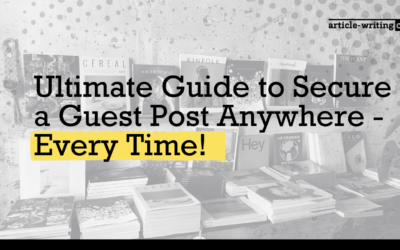Help a Reporter Out (HARO) is an application that journalists and PR firms use. HARO connects journalists and bloggers to experts in various fields who may be used as content sources. Press can publish relevant content backed by respected sources, while the sources themselves benefit from significant exposure by new audiences. As you can imagine, it creates a mutually beneficial relationship between the press and business owners looking to increase backlinks. If you use HARO successfully, the impact on your business can be substantial.
Companies often team up with writers from HARO for PR that likely wouldn’t have reached intended audiences by the company’s word alone. These reporter/business relationships can lead to in-article quotes from you or your company, and there may even be an opportunity for full features or press releases about your company, should your presented material be deserving. If you’re willing to put in the work, maintaining positive professional relationships with the writers you come across can do wonders for your company’s brand in the long run.
HARO seems to be the perfect solution to boost site traffic and online authority, but not everyone understands how to effectively use the site. This guide will give you a clear understanding of how to make the most of HARO to get your content created and viewed by your ideal audience.
How Does HARO Work?
You’ll need to create an account, either as a reporter or a source, to get started on HARO. Sources begin by defining topic areas that align with their business niche. These sources then receive emails containing a list of journalists that have source requests pertaining to these topic areas. As a source, you can respond to the requests that interest you with a pitch. It’s important to choose requests from journalists that fall in line with your areas of expertise and that you believe will provide the most exposure. The journalist then reviews the source pitches and chooses the ones they’d like to use for their articles.

How Much Does HARO Cost?
Basic
HARO offers a free membership, which allows for three quote request notifications per day. This basic plan is great if you’re a new business looking to check HARO out before you commit to a higher-tier plan with more features.
Standard
At only $19 per month, you can create a profile unique to you and your business that reporters can view when you pitch. The Standard membership also enables you to use one keyword alert. When you receive source request notifications, the requests will be related to the keyword you’ve chosen, making it easier to receive requests that pertain to your brand. If your business thrives in a niche market and you’re only interested in sourcing one topic, this plan is the perfect fit for you.
Advanced
This plan comes in at $49 per month and includes all the perks of the Standard plan. Additionally, Advanced users are granted two extra keywords to assist in filtering through media opportunities. It also provides three profiles to use alternately and insert into pitches. With this three-profile feature, multiple people within your business can respond to different quote requests. Though $49 seems like a steep increase, it’s more cost-effective and beneficial to your business than using three Standard accounts for different employees. This plan works well for mid-sized marketing or PR firms that need to view a range of topic requests for their clients.
Premium
The Premium plan is $149 per month, with the bump in price permitting you to use unlimited keywords and user profiles. This membership also comes with a special support system available by phone and email. Though, it’s not necessary for a successful HARO venture. It need only be used by large companies with an entire PR or marketing department, in which 10+ employees would use the site.
Subscribing to Industry Feeds
Subscribing to the industry feeds that suit your interests and business needs is the only way to build the backlinks you need to help your website thrive. Signing up for HARO means that you’re automatically subscribed to the daily request list, but requests for categories outside of your interests can feel stressful. First-time users may feel the urge to submit to whatever they can. But if you’re an up-and-coming artist pitching to a reporter looking for leads about the housing market, you’re not focused on the right members.
It’s important to think about your niche demographic. If you’re a comic artist, it’s best to choose a HARO alert that’ll work for you, say arts and entertainment. If instead, you pitch to a reporter looking to find leads on what comics Marvel and DC may adapt next, you’re more likely to be considered an expert in your field. You can then have your source selected and the audience connected to your work.
It’s a good idea to add word filters to your email service. This way, HARO emails with your keywords only make it to the top of your inbox. When one pops up in your inbox, you’ll know there’s likely something in the queries list that you’ll want to pitch to.
Act Fast
HARO is a competitive market. Though it’s important to stay selective about who you’re pitching to, it’s equally important to stay on top of your request emails. Currently, HARO claims to have over 800,000 source profiles and 55,000 journalists (some of which come from Time, Reuters, and The Globe and Mail). Don’t let the numbers fool you, though; that’s a 3:50 ratio. Of course, not everyone will compete in your niche, but the competition is formidable. Pay attention to the listing deadlines, and don’t wait until the last minute. The more time you let pass, the higher the chances are that someone sent a great pitch before you.
Write an Amazing Pitch
Sounds easy enough, right? Seriously, pitching on HARO doesn’t have to be hard. You should think of it as a less daunting task than pitching outside of the platform. Putting your ideas out into the world for scrutiny is never easy, but rest assured that the reporters on HARO wouldn’t be submitting requests for ideas if they weren’t willing to hear yours. You just have to make sure that your ideas rise above the rest. Here’s how to do just that:
Don’t Overthink Your Subject Line

Reporters on HARO receive hundreds of pitch emails daily, so yours needs to stand out and get straight to the point. Make sure you include keywords that your writer can search for to avoid getting lost in their inbox. Here are some examples:
- Comic-Con Updates + Marvel Movie Ideas from Comic Artists
- Graphic Novels 2019 – Best Selling + Coming Soon
Get to the Point
You’re not writing a letter, you’re writing a pitch. Journalists are very busy, so you don’t want them skimming through your idea.
Greet your contact by name, then get straight to the point. Be as concise as you can—use a few key sentences in your introduction. The aim here is to introduce your concept, and note humbly that you’re expertly qualified to talk about it.
Use bullet points (3-4, ideally) to help the reporter get through your pitch faster. In these points, explain your concept and give unique answers to any of the reporter’s questions. Be creative, too. Your answers shouldn’t be redundant or easily found on Google.
Lastly, leave your contact information and make sure it matches your business and pitch. Display your name and job title correctly and include links to your website and any appropriate social media.
Whether you’re looking to get PR for your startup or you’re a well-established company looking for new angles on your marketing campaign, HARO is a great opportunity. If you’re looking to get support in your marketing campaign, look no further. Book a call with us today and let’s get you the attention you deserve!

David is the Founder and Director of article-writing.co, the fastest-growing content creation agency in North America. He has transformed companies by offering high-quality content that has impacted their SEO ranking, revitalized websites with engaging and industry-relevant blogs and website copy, and championed successful email campaign copy.




